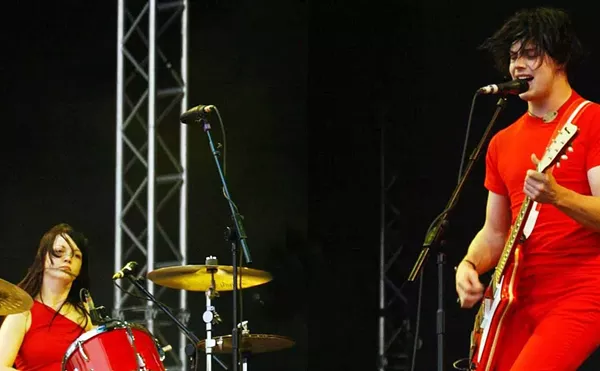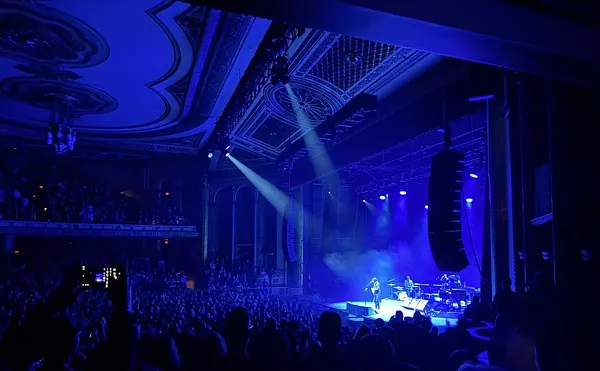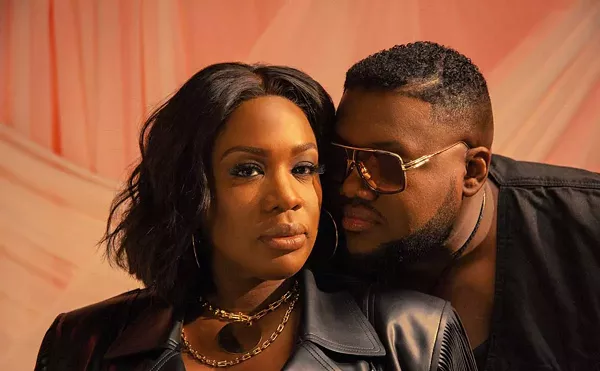
Audio By Carbonatix
[
{
"name": "GPT - Leaderboard - Inline - Content",
"component": "35519556",
"insertPoint": "5th",
"startingPoint": "3",
"requiredCountToDisplay": "3",
"maxInsertions": 100,
"adList": [
{
"adPreset": "LeaderboardInline"
}
]
}
]
Last week I was invited to attend a taping of a few songs performed by onetime Vandellas leader Martha Reeves and the Supremes' Mary Wilson at Detroit Public TV's studios in Wixom. Those songs will later be added as new segments to the popular television special Motown 25: Yesterday, Today, Forever, which originally aired in 1983 and is set to be re-broadcast on Saturday, Feb. 28 at 7:30 p.m. on WTVS. I jumped at the chance to speak with Reeves before filming, to talk about her early work with the label.
Since her 2005-2009 stint on Detroit City Council, Reeves is back to performing 30 weeks a year. And thanks to her voice health teacher, she can still sing everything she ever recorded. "Now I'm a senior citizen, but I'm proud," she says. "When people refer to us as oldies but goodies? Yes, I am old. And yes, I am still good at what I do. 'Legendary' doesn't scare me." (Oh, and if any museum curators are reading this, she also said that she still has an entire house filled with Vandella costumes!)
On singing from a very early age
"My singing goes back to when I was 3 years old in my grandfather's church. Mom, while she was doing my hair, would teach me poems and songs. I think she lived vicariously through me. She wanted to be a singer and idolized Billie Holiday, so she taught me a lot of songs that Billie Holiday sang and a lot of church songs. We were the generation before television. So it was family gatherings where we would sing the most.
"In elementary school, Emily Wagstaff, who was no taller than us, a little German lady, taught me all the anthems and favorite songs of hers. So when the class would end, maybe five minutes before the clock would strike for the next class, she would have me sing for class. And then in high school, Abraham Silver taught the choir 'Hallelujah' and I was chosen to sing the aria. He featured us at the Henry Ford Auditorium. When they tore it down last year, I cried. Because that's where I heard 4,500 people applaud. That's where I knew I had a voice. That's where I knew I was gonna be a singer — 4,500 people applauding just blew my mind. I wanted to hear it again and again."
On recording "(Love Is Like A) Heat Wave"
"I had put on my party dress and my hard-to-wear shoes to go to a Christmas party at Hitsville USA's studio. They had a party going on in one of the buildings that Berry [Gordy, Motown founder] had bought, I think it might have been where his office was, where that vacant lot is now, there was a house that burned down of the eight houses that Berry bought on the boulevard. And we were over there partying and [Motown hit songwriting team] Holland-Dozier-Holland, especially Brian [Holland], came to me and said, 'Martha, come over to studio A, we have a song for you.' But I wanted to go to the party! I didn't want to be singing. It was winter, it was December, a Christmas party. I'm going, 'No!' They said, 'Oh, we got a song for you.' And everybody was excited. We used to fight over songs. The competition was to find the best song. So when Holland-Dozier-Holland say they got a song for you, you go!
"So I left the party, and Eddie Holland taught me the lyrics to '(Love Is Like A) Heat Wave.' Brian taught the girls, Rosalind and Annette, the background to '(Love Is Like A) Heat Wave,' and then Lamont Dozier was playing the piano when I first heard it. So we learned the song, the next thing you know they have a track already cut, we go into the studio, we record it, and it becomes the first Grammy nomination of Hitsville's history. And Berry also declared this was the sound he'd been looking for: the excitement, the sound of young America.
"I could tell that there was gonna be some history made because of all we had to go through and overcome to be on Motown. It wasn't a big record company. It was a small house with a man making music out of a renovated garage. The sound equipment was fantastic though, and it never shut. Twenty-four hours, seven days a week, it was always open. You were always there doing something. If it wasn't taking lessons over at Quality Control and Artist Development, you were in the studio overdubbing, or listening to a mix, or singing background for somebody, or taking down lyrics. That was my job, in the A & R Department. I handled a lot of the musicians — calling them on the phone, getting them to the studio. It was a house that had a lot of busy-bee activities going on that you just wanted to be a part of. There was always some excitement. There was always somebody making some music. And I'm glad to have been there. I'm so glad to have been a part of that."





